CADILLAC STS 2009 1.G Owners Manual
Manufacturer: CADILLAC, Model Year: 2009, Model line: STS, Model: CADILLAC STS 2009 1.GPages: 514, PDF Size: 2.73 MB
Page 191 of 514

To operate the vehicle with the DRL off, turn the
exterior lamp control off and then do one of the
following:
Turn the exterior lamp control to the parking lamp
position.
Turn the exterior lamp control to the headlamp
position.
Turn the exterior lamp control from AUTO to off and
back to AUTO.
An AUTOMATIC LIGHTS OFF message will appear
on the DIC, showing that automatic lighting has
been disabled. SeeDIC Warnings and Messages
on page 3-79.
The regular headlamp system should be turned on
when needed.
Light Sensor
The light sensor for the DRL is located on top of the
instrument panel. If the sensor is covered, it will prevent it
from sensing light, and the exterior lamps may come on
when they are not needed.
3-37
Page 192 of 514

Fog Lamps
The fog lamp controls are located on the turn
signal/multifunction lever.
#(Fog Lamps):The band with this symbol is used to
turn the fog lamps on and off.
The parking lamps must be on for the fog lamps
to work.
To turn the fog lamps on or off, turn the fog lamp band
on the lever up to the dot and release it. The band
will return to its original position.
If the high-beam headlamps are turned on, the fog
lamps will turn off. The fog lamps will come back
on when the high-beam headlamps are off.
Some localities have laws that require the headlamps to
be on along with the fog lamps.
Twilight Sentinel®
Twilight Sentinel®can turn the lamps on and off for you.
A light sensor on top of the instrument panel makes the
Twilight Sentinel work, so be sure it is not covered.
3-38
Page 193 of 514
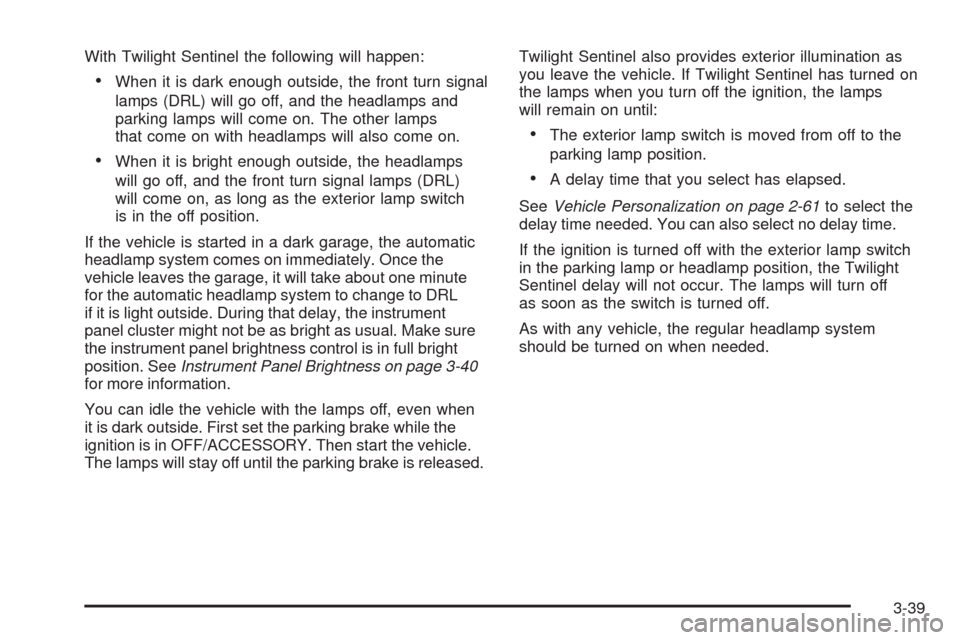
With Twilight Sentinel the following will happen:
When it is dark enough outside, the front turn signal
lamps (DRL) will go off, and the headlamps and
parking lamps will come on. The other lamps
that come on with headlamps will also come on.
When it is bright enough outside, the headlamps
will go off, and the front turn signal lamps (DRL)
will come on, as long as the exterior lamp switch
is in the off position.
If the vehicle is started in a dark garage, the automatic
headlamp system comes on immediately. Once the
vehicle leaves the garage, it will take about one minute
for the automatic headlamp system to change to DRL
if it is light outside. During that delay, the instrument
panel cluster might not be as bright as usual. Make sure
the instrument panel brightness control is in full bright
position. SeeInstrument Panel Brightness on page 3-40
for more information.
You can idle the vehicle with the lamps off, even when
it is dark outside. First set the parking brake while the
ignition is in OFF/ACCESSORY. Then start the vehicle.
The lamps will stay off until the parking brake is released.Twilight Sentinel also provides exterior illumination as
you leave the vehicle. If Twilight Sentinel has turned on
the lamps when you turn off the ignition, the lamps
will remain on until:
The exterior lamp switch is moved from off to the
parking lamp position.
A delay time that you select has elapsed.
SeeVehicle Personalization on page 2-61to select the
delay time needed. You can also select no delay time.
If the ignition is turned off with the exterior lamp switch
in the parking lamp or headlamp position, the Twilight
Sentinel delay will not occur. The lamps will turn off
as soon as the switch is turned off.
As with any vehicle, the regular headlamp system
should be turned on when needed.
3-39
Page 194 of 514

Exterior Lighting Battery Saver
If the parking lamps or headlamps have been left on,
the exterior lamps will turn off about 10 minutes after the
ignition is turned off. This protects against draining the
battery in case you have accidentally left the headlamps
or parking lamps on. The battery saver does not work
if the headlamps are turned on after the ignition is
turned off.
If you need to leave the lamps on for more than
10 minutes, use the exterior lamp control to turn
the lamps back on.
Instrument Panel Brightness
Press the center knob on
the DIC control panel to
extend. Then turn the knob
clockwise to brighten the
lights or counterclockwise
to dim them. If the knob
is turned completely
clockwise, the interior
lamps turn on.
Base Level Shown,
Uplevel Similar
3-40
Page 195 of 514

Entry Lighting
The entry lighting system turns on the reading and
dome lamps and the backlighting to the exterior lamp
control when a door is opened or if you press the remote
keyless entry transmitter unlock button. If activated by
the transmitter, the lighting will remain active for about
25 seconds. The entry lighting system uses the light
sensor; it must be dark outside in order for the lamps to
turn on. The lamps turn off about 25 seconds after the
last door is closed. They will dim to off if the ignition is
on, or immediately deactivate if the power locks are
activated.
Parade Dimming
This feature prohibits dimming of the instrument panel
displays and backlighting during daylight hours when
the key is in the ignition and the headlamps are on.
This feature operates with the light sensor and is fully
automatic. When the light sensor reads darkness outside
and the parking lamps are active, the instrument panel
displays can be adjusted by turning the instrument panel
brightness knob. SeeInstrument Panel Brightness on
page 3-40for additional information.
Reading Lamps
The reading lamps are located on the overhead console.
These lamps come on automatically when any door is
opened.
For manual operation, press the button next to each
lamp to turn it on or off.
If the reading lamps are left on, they automatically shut
off 10 minutes after the ignition has been turned off.
Battery Load Management
The battery load management feature is designed to
monitor the vehicle’s electrical load and determine when
the battery is in a heavy discharge condition. During
times of high electrical loading, the engine may idle at a
higher revolutions per minute (rpm) setting than normal to
make sure the battery charges. High electrical loads may
occur when several of the following are on: headlamps,
high beams, fog lamps, rear window defogger, the
climate control fan at high speeds, heated seats and
engine cooling fans.
If the battery continues to discharge, even with the
engine idling at a higher rpm setting, some electrical
loads will automatically be reduced. When this occurs,
the rear window defogger may take slightly longer to clear
the glass and the fan may cut back to a lower speed.
For more battery saving information, see “Battery Saver
Active Message” underDIC Warnings and Messages on
page 3-79.
3-41
Page 196 of 514

Electric Power Management
The vehicle has Electric Power Management (EPM) that
estimates the battery’s temperature and state of charge.
It then adjusts the voltage for best performance and
extended life of the battery.
When the battery’s state of charge is low, the voltage is
raised slightly to quickly bring the charge back up. When
the state of charge is high, the voltage is lowered slightly
to prevent overcharging. If the vehicle has a voltmeter
gage or a voltage display on the Driver Information
Center (DIC), you may see the voltage move up or
down. This is normal. If there is a problem, an alert
will be displayed.
The battery can be discharged at idle if the electrical
loads are very high. This is true for all vehicles. This is
because the generator (alternator) may not be spinning
fast enough at idle to produce all the power that is
needed for very high electrical loads.
A high electrical load occurs when several of the
following are on: headlamps, high beams, fog lamps,
rear window defogger, climate control fan at high speed,
heated seats, engine cooling fans, trailer loads, and
loads plugged into accessory power outlets.EPM works to prevent excessive discharge of the
battery. It does this by balancing the generator’s output
and the vehicle’s electrical needs. It can increase
engine idle speed to generate more power, whenever
needed. It can temporarily reduce the power demands
of some accessories.
Normally, these actions occur in steps or levels, without
being noticeable. In rare cases at the highest levels of
corrective action, this action may be noticeable to the
driver. If so, a Driver Information Center (DIC) message
might be displayed, such as Battery Saver Active or
Service Battery Charging System. If this message is
displayed, it is recommended that the driver reduce the
electrical loads as much as possible. SeeDIC Warnings
and Messages on page 3-79.
Inadvertent Power Battery Saver
This feature is designed to protect the vehicle’s battery
against drainage from the interior lamps, trunk lamp,
glove box lamp, or the garage door opener. When the
ignition is turned off, the power to these features will
automatically turn off after 10 minutes (three minutes
if a new car has 15 miles (24 km) or less). Power will
be restored for an additional 10 minutes if any door
is opened, the trunk is opened or the courtesy lamp
switch is turned on.
3-42
Page 197 of 514
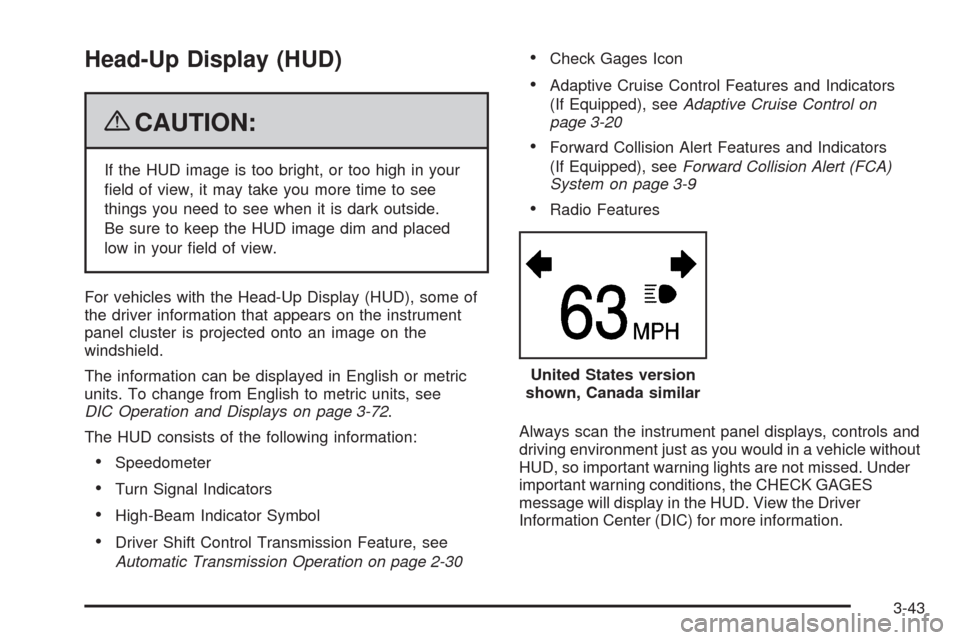
Head-Up Display (HUD)
{CAUTION:
If the HUD image is too bright, or too high in your
�eld of view, it may take you more time to see
things you need to see when it is dark outside.
Be sure to keep the HUD image dim and placed
low in your �eld of view.
For vehicles with the Head-Up Display (HUD), some of
the driver information that appears on the instrument
panel cluster is projected onto an image on the
windshield.
The information can be displayed in English or metric
units. To change from English to metric units, see
DIC Operation and Displays on page 3-72.
The HUD consists of the following information:
Speedometer
Turn Signal Indicators
High-Beam Indicator Symbol
Driver Shift Control Transmission Feature, see
Automatic Transmission Operation on page 2-30
Check Gages Icon
Adaptive Cruise Control Features and Indicators
(If Equipped), seeAdaptive Cruise Control on
page 3-20
Forward Collision Alert Features and Indicators
(If Equipped), seeForward Collision Alert (FCA)
System on page 3-9
Radio Features
Always scan the instrument panel displays, controls and
driving environment just as you would in a vehicle without
HUD, so important warning lights are not missed. Under
important warning conditions, the CHECK GAGES
message will display in the HUD. View the Driver
Information Center (DIC) for more information.United States version
shown, Canada similar
3-43
Page 198 of 514
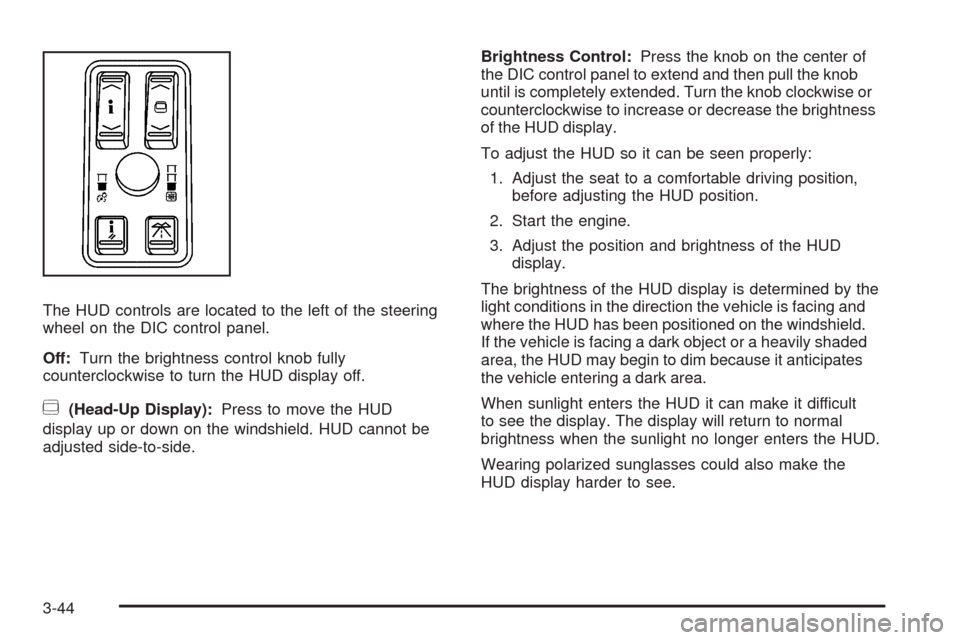
The HUD controls are located to the left of the steering
wheel on the DIC control panel.
Off:Turn the brightness control knob fully
counterclockwise to turn the HUD display off.
~(Head-Up Display):Press to move the HUD
display up or down on the windshield. HUD cannot be
adjusted side-to-side.Brightness Control:Press the knob on the center of
the DIC control panel to extend and then pull the knob
until is completely extended. Turn the knob clockwise or
counterclockwise to increase or decrease the brightness
of the HUD display.
To adjust the HUD so it can be seen properly:
1. Adjust the seat to a comfortable driving position,
before adjusting the HUD position.
2. Start the engine.
3. Adjust the position and brightness of the HUD
display.
The brightness of the HUD display is determined by the
light conditions in the direction the vehicle is facing and
where the HUD has been positioned on the windshield.
If the vehicle is facing a dark object or a heavily shaded
area, the HUD may begin to dim because it anticipates
the vehicle entering a dark area.
When sunlight enters the HUD it can make it difficult
to see the display. The display will return to normal
brightness when the sunlight no longer enters the HUD.
Wearing polarized sunglasses could also make the
HUD display harder to see.
3-44
Page 199 of 514
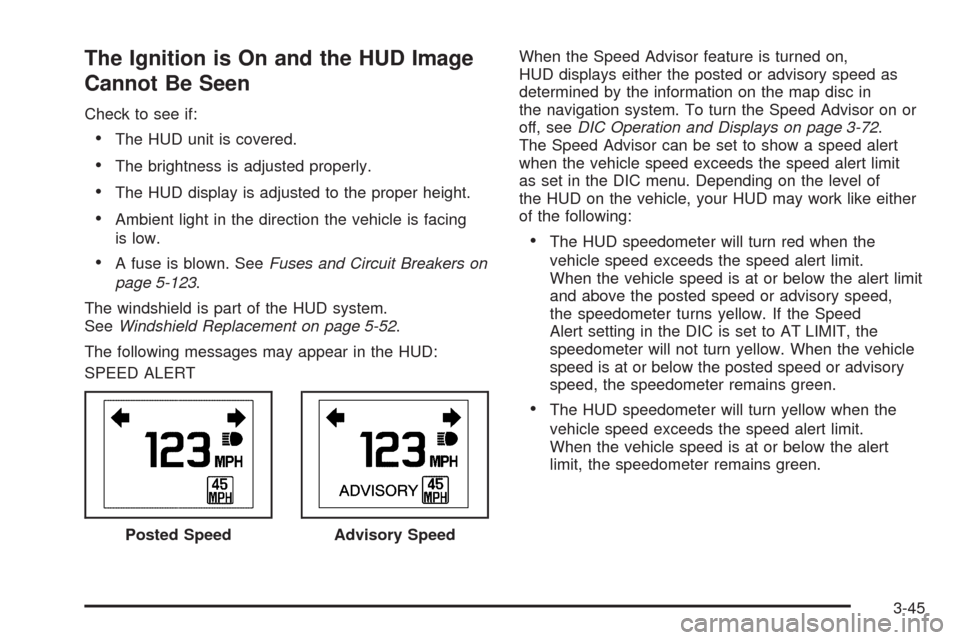
The Ignition is On and the HUD Image
Cannot Be Seen
Check to see if:
The HUD unit is covered.
The brightness is adjusted properly.
The HUD display is adjusted to the proper height.
Ambient light in the direction the vehicle is facing
is low.
A fuse is blown. SeeFuses and Circuit Breakers on
page 5-123.
The windshield is part of the HUD system.
SeeWindshield Replacement on page 5-52.
The following messages may appear in the HUD:
SPEED ALERTWhen the Speed Advisor feature is turned on,
HUD displays either the posted or advisory speed as
determined by the information on the map disc in
the navigation system. To turn the Speed Advisor on or
off, seeDIC Operation and Displays on page 3-72.
The Speed Advisor can be set to show a speed alert
when the vehicle speed exceeds the speed alert limit
as set in the DIC menu. Depending on the level of
the HUD on the vehicle, your HUD may work like either
of the following:
The HUD speedometer will turn red when the
vehicle speed exceeds the speed alert limit.
When the vehicle speed is at or below the alert limit
and above the posted speed or advisory speed,
the speedometer turns yellow. If the Speed
Alert setting in the DIC is set to AT LIMIT, the
speedometer will not turn yellow. When the vehicle
speed is at or below the posted speed or advisory
speed, the speedometer remains green.
The HUD speedometer will turn yellow when the
vehicle speed exceeds the speed alert limit.
When the vehicle speed is at or below the alert
limit, the speedometer remains green.
Posted Speed
Advisory Speed
3-45
Page 200 of 514
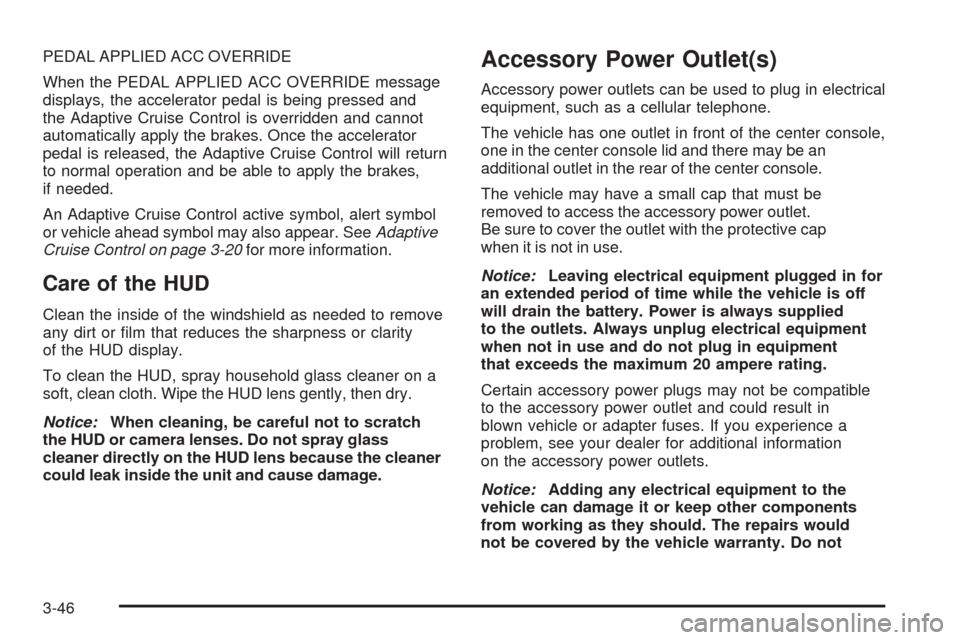
PEDAL APPLIED ACC OVERRIDE
When the PEDAL APPLIED ACC OVERRIDE message
displays, the accelerator pedal is being pressed and
the Adaptive Cruise Control is overridden and cannot
automatically apply the brakes. Once the accelerator
pedal is released, the Adaptive Cruise Control will return
to normal operation and be able to apply the brakes,
if needed.
An Adaptive Cruise Control active symbol, alert symbol
or vehicle ahead symbol may also appear. SeeAdaptive
Cruise Control on page 3-20for more information.
Care of the HUD
Clean the inside of the windshield as needed to remove
any dirt or �lm that reduces the sharpness or clarity
of the HUD display.
To clean the HUD, spray household glass cleaner on a
soft, clean cloth. Wipe the HUD lens gently, then dry.
Notice:When cleaning, be careful not to scratch
the HUD or camera lenses. Do not spray glass
cleaner directly on the HUD lens because the cleaner
could leak inside the unit and cause damage.
Accessory Power Outlet(s)
Accessory power outlets can be used to plug in electrical
equipment, such as a cellular telephone.
The vehicle has one outlet in front of the center console,
one in the center console lid and there may be an
additional outlet in the rear of the center console.
The vehicle may have a small cap that must be
removed to access the accessory power outlet.
Be sure to cover the outlet with the protective cap
when it is not in use.
Notice:Leaving electrical equipment plugged in for
an extended period of time while the vehicle is off
will drain the battery. Power is always supplied
to the outlets. Always unplug electrical equipment
when not in use and do not plug in equipment
that exceeds the maximum 20 ampere rating.
Certain accessory power plugs may not be compatible
to the accessory power outlet and could result in
blown vehicle or adapter fuses. If you experience a
problem, see your dealer for additional information
on the accessory power outlets.
Notice:Adding any electrical equipment to the
vehicle can damage it or keep other components
from working as they should. The repairs would
not be covered by the vehicle warranty. Do not
3-46